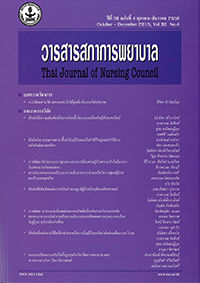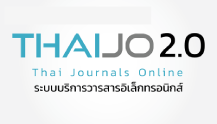ปัจจัยที่มีอิทธิพลต่อการปรับตัวของญาติผู้ป่วยวิกฤติทางศัลยศาสตร์
Keywords:
อาการนอนไม่หลับ, การตัดสินใจ, ความพร้อมในการดูแล, การปรับตัว, การดูแลแบบประคับประคอง, sleeplessness, decision-making ability, caregiving readiness, adjustment, palliative careAbstract
บทคัดย่อ: วัตถุประสงค์ของการวิจัย: เพื่อศึกษาอิทธิพลของ อาการนอนไม่หลับ การตัดสินใจ ความพร้อมในการดูแล ต่อการปรับตัวของญาติผู้ป่วย
การออกแบบการวิจัย: วิธีวิจัยแบบบรรยายเชิงทำนาย (descriptive predictive study)
วิธีดำเนินการวิจัย: กลุ่มตัวอย่าง มีอายุ 18 ปีขึ้นไป เป็นญาติของผู้ป่วยวิกฤติที่เข้ารับการ รักษาในหอผู้ป่วยวิกฤติมากกว่า 3 วัน จำนวน 77 คน ในโรงพยาบาลมหาวิทยาลัยแห่งหนึ่งใน กรุงเทพมหานคร เครื่องมือที่ใช้ในการศึกษา ประกอบด้วย แบบสอบถามข้อมูลส่วนบุคคล แบบ แบบประเมินอาการนอนไม่หลับ แบบประเมินความสามารถในการตัดสินใจ แบบประเมินความพร้อม ในการดูแลของญาติผู้ดูแล และแบบประเมินการปรับตัวแบบย่อ วิเคราะห์ข้อมูลโดยการวิเคราะห์ ถดถอยพหุคูณ
ผลการวิจัย: พบว่า ญาติผู้ป่วยมีอายุเฉลี่ย 42 ปี (S.D. = 11.11ปี) ส่วนใหญ่เป็นเพศหญิง มีคะแนนการปรับตัวเพื่อเผชิญปัญหาแบบมุ่งแก้ปัญหา (Problem focus coping) เฉลี่ย 20.18 (S.D. = 3.029) คะแนนความบกพร่องในการปรับตัวเพื่อเผชิญปัญหา (Dysfunction coping) เฉลี่ย = 28.95 (S.D. = 3.842) และคะแนนปรับตัวเพื่อเผชิญปัญหาด้านอารมณ์ (Emotional focus coping) เฉลี่ย = 22.40 ( S.D. = 5.310) พบว่าอาการนอนไม่หลับมีความสัมพันธ์ทางบวกกับ ความบกพร่องในการปรับตัวเพื่อเผชิญปัญหา (r = .259, p<0.05) ความพร้อมในการดูแล มีความ สัมพันธ์ทางบวกกับการปรับตัวเพื่อเผชิญปัญหาด้านอารมณ์และการปรับตัวเพื่อเผชิญปัญหา แบบมุ่งแก้ปัญหา (r = .439, p<0.01; r = .598, p<0.01) แต่ความสามารถในการตัดสินใจไม่มี ความสัมพันธ์กับการปรับตัวของญาติผู้ป่วย อาการนอนไม่หลับ การตัดสินใจและความพร้อมใน การดูแล สามารถร่วมทำนายการปรับตัวเพื่อเผชิญปัญหาแบบมุ่งแก้ปัญหาของญาติผู้ป่วยได้ร้อยละ 10 (Adjust R square =0.100, p = 0.01) และร่วมทำนายการปรับตัวเพื่อเผชิญปัญหาด้านอารมณ์ ได้ร้อยละ16.8 (Adjust R square =0.168, p = 0.001)
ข้อเสนอแนะ: พยาบาลและทีมสุขภาพควรส่งเสริมการปรับตัวของญาติผู้ป่วยวิกฤติ โดยการ ให้ข้อมูล และแสวงหาแหล่งสนับสนุนอย่างเหมาะสมเพื่อให้เกิดความพร้อมในการดูแล ร่วมกับ การประเมินและแก้ไขปัญหาเรื่องการนอนหลับของญาติผู้ป่วยด้วยวิธีการที่หลากหลายซึ่งถือว่า เป็นการดูแลแบบประคับประคองที่จะเอื้อให้ญาติผู้ป่วยมีการปรับตัวอย่างมีประสิทธิภาพ
Abstract: Objective: To examine the impact of sleeplessness, decision-making, and caregiving readiness on the adjustment process of patients’ relatives.
Design: Descriptive predictive study.
Implementation: This study was conducted on 77 subjects who were 18 years old or older. The subjects were relatives of surgically critical patients who had been treated for more than 3 days in the intensive care unit of a campus hospital in Bangkok. The research instruments consisted of (1) a personal information questionnaire; (2) a sleeplessness assessment form; (3) a decision-making capacity evaluation form; (4) a caregiver readiness evaluation form; and (5) a simplified adjustment assessment form. The data were analysed using multiple regression analysis.
Results: The majority of the subjects (patients’ relatives) were female, with an average age of 42 (SD = 11.11). They displayed an average problem-focus coping score of 20.18 (SD = 3.029), an average dysfunction coping score of 28.49 (SD = 3.842), and an average emotional-focus coping score of 22.40 (SD = 5.310). The factor of sleeplessness was found to have a positive relationship with the subjects’ dysfunction coping ability (r = .259, p < 0.05); similarly, the subjects’ caregiving readiness was also found in a positive relationship with their emotional-focus coping ability and problem-focus coping ability (r = .439, p < 0.01 and r = .598, p < 0.01, respectively). By contrast, the subjects’ decision-making ability was found to have no significant relationship with their adjustment ability. Finally, the subjects’ sleeplessness, decision-making ability, and caregiving readiness were capable of jointly predicting the problem-focus coping ability in 10 percent of the subjects (Adjust R square = 0.100, p = 0.01) and predicting the emotional-focus coping ability in 16.8 percent of the subjects (Adjust R square = 0.168, p = 0.001).
Recommendations: It is recommended that nurses and healthcare personnel jointly promote the adjustment ability of patients’ relatives and increase their caregiving readiness, by means of supplying information and suggesting proper sources of knowledge. In addition, sleeplessness in patients’ relatives needs to be assessed and addressed using various methods. All these forms of palliative care are considered conducive to enhancing the adjustment ability of patients’ relatives.
References
Davidson JE, Powers K, Hedayat KM, Tieszen M, Kon AA, Shepard E, et al. Clinical practice guidelines for support of the family in the patient-centered intensive care unit: American College of Critical Care Medicine Task Force 2004–2005. Crit Care Med 2007;35:605-22.
Kirchhoff KT, Song M-K, Kehl K. Caring for the family of the critically ill patient. Crit Care Clin 2004; 20:453-66.
Andershed B. Relatives in end–of–life care–part 1: a systematic review of the literature the five last years, January 1999–February 2004. J Clin Nurs 2006;15:1158-69.
Puntillo KA, Dracup KA, Mcadam JL, Fontaine DK. White DB Symptom experiences of family members of intensive care unit patients at high risk for dying. Crit Care Med 2010; 38:1078-85.
Söderström I-MK, Saveman B-I, Hagberg MS, Benzein EG. Family adaptation in relation to a family member’s stay in ICU. Int Crit Care Nurs 2009; 25:250-7.
Chan KS, Twinn S. An analysis of the stressors and coping strategies of Chinese adults with a partner admitted to an intensive care unit in Hong Kong: an exploratory study. J Clin Nurs 2007;16:185-93.
Morton P, Fontaine D. Critical care nursing: A holistic approach. 10th ed. Philadelphia: Wolters Kluwer Health; 2013.
Kentish-Barnes N, Lemiale V, Chaize M, Pochard F, Azoulay E. Assessing burden in families of critical care patients. Crit Care Med 2009;37:S448-S56.
Chui WYY, Chan SWC. Stress and coping of Hong Kong Chinese family members during a critical illness. J Clin Nurs 2007;16(2):372-81.
Wartella JE, Auerbach SM, Ward KR. Emotional distress, coping and adjustment in family members of neuroscience intensive care unit patients. J Psychosom Res 2009;66:503-9.
McKeown A, Cairns C, Cornbleet M, Longmate A. Palliative care in the intensive care unit: an interview-based study of the team perspective. Int J Palliat Nurs 2010;16:334-8.
Hudson PL, Thomas K, Trauer T, Remedios C, Clarke D. Psychological and social profile of family caregivers on commencement of palliative care. J Pain Symptom Manag 2011;41:522-34.
Roy C. The Roy adaptation model. 3th ed. Upper Saddle River, New Jersey: Pearson;2008.
Morin CM, Barlow DH. Insomnia: Psychological assessment and management: Guilford Press New York; 1993.
Lopez RP. Decision–making for acutely ill nursing home residents: nurses in the middle. J Adv Nurs 2009; 65(5):1001-9.
Archbold PG, Stewart BJ, Greenlick MR, Harvath T. Mutuality and preparedness as predictors of caregiver role strain. Res Nurs Health 1990;13:375-84.
Carver CS. You want to measure coping but your protocol’ too long: Consider the brief cope. Int J Behav Med 1997;4:92-100.
Spiegel K, Leproult R, Van Cauter E. Impact of sleep debt on metabolic and endocrine function. Lancet 1999; 354:1435-9.
Rittman, M., Hinojosa, M. S., & Findley, K. (2009). Subjective sleep, burden, depression, and general health among caregivers of veterans poststroke. J Neurosci Nurs 2009;41: 39-52.
Day, A., Haj-Bakri, S., Lubchansky, S., & Mehta, S. (2013). Sleep, anxiety and fatigue in family members of patients admitted to the intensive care unit: a questionnaire study. Crit Care 2013;17/R19.
Roy C. Extending the Roy adaptation model to meet changing global needs. Nurs Sci Q 2011;24:345-51.
Schumacher, K. L., Stewart, B. J., & Archbold, P. G. (2007). Mutuality and preparedness moderate the effects of caregiving demand on cancer family caregiver outcomes. Nurs Res 2007; 56:425-33.
Bailey JJ, Sabbagh M, Loiselle CG, Boileau J, McVey L. Supporting families in the ICU: A descriptive correlational study of informational support, anxiety, and satisfaction with care. Int Crit Care Nurs 2010; 26:114-22.






